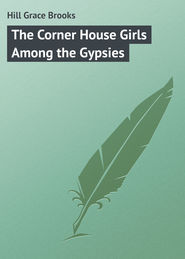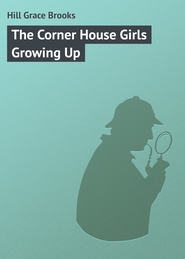По всем вопросам обращайтесь на: info@litportal.ru
(©) 2003-2024.
✖
The Corner House Girls
Настройки чтения
Размер шрифта
Высота строк
Поля
“But Aunt Sarah’s always said the property ought to come to her, when Uncle Peter died.”
“I hope he has left her something – I do hope so. It would help out a lot,” said Aggie, serious for the moment.
“Why – yes. It would be easier for us to get along, if she had her own support,” admitted Ruth.
“And we’d save five cents a week for peppermints!” giggled Aggie suddenly, seeing the little white bag of candy on the table.
“How you do talk, Ag,” said Ruth, admonishingly, and considering herself presentable, she went through the bedroom into the front room, or “parlor,” of the flat. Aggie had to stay to watch the cake, which was now turning a lovely golden brown in the oven.
The tall, gray gentleman with the sharp eyes and beak-like nose, had been ushered in by the two little girls and had thankfully taken a seat. He was wiping his perspiring forehead with a checked silk handkerchief, and had set the high hat down by his chair.
Those quick, gray eyes of his had taken in all the neat poverty of the room. A careful and tasteful young housekeeper was Ruth Kenway. Everything was in its place; the pictures on the wall were hung straight; there was no dust.
In one of the two rockers sat Aunt Sarah. It was the most comfortable rocker, and it was drawn to the window where the sun came in. Aunt Sarah had barely looked up when the visitor entered, and of course she had not spoken. Her knitting needles continued to flash in the sunlight.
She was a withered wisp of a woman, with bright brown eyes under rather heavy brows. There were three deep wrinkles between those eyes. Otherwise, Aunt Sarah did not show in her countenance many of the ravages of time.
Her hair was but slightly grayed; she wore it “crimped” on the sides, doing it up carefully in cunning little “pigtails” every night before she retired. She was scrupulous in the care of her hands; her plain gingham dress was neat in every particular.
Indeed, she was as prim and “old-maidish” as any spinster lady possibly could be. Nothing ever seemed to ruffle Aunt Sarah. She lived sort of a detached life in the Kenway family. Nothing went on that she was not aware of, and often – as even Ruth admitted – she “had a finger in the pie” which was not exactly needed!
“I am Mr. Howbridge,” said the visitor, rising and putting out his hand to the oldest Kenway girl, and taking in her bright appearance in a single shrewd glance.
On her part, Aunt Sarah nodded, and pressed her lips together firmly, flashing him another birdlike look, as one who would say: “That is what I expected. You could not hide your identity from me.”
“I am – or was,” said the gentleman, clearing his throat and sitting down again, but still addressing himself directly to Ruth, “Mr. Peter Stower’s attorney and confidant in business – if he could be said to be confidential with anybody. Mr. Stower was a very secretive man, young lady.”
Aunt Sarah pursed her lips and tossed her head, as though mentally saying: “You can’t tell me anything about that.”
Ruth said: “I have heard he was peculiar, sir. But I do not remember of ever seeing him.”
“You did see him, however,” said Mr. Howbridge. “That was when you were a very little girl. If I am not mistaken, it was when this lady,” and he bowed to the silent, knitting figure in the rocking-chair, “who is known as your Aunt Sarah, came to live with your mother and father.”
“Possibly,” said Ruth, hastily. “I do not know.”
“It was one of few events of his life, connected in any way with his relatives, of which Mr. Stower spoke to me,” Mr. Howbridge said. “This lady expressed a wish to live with your mother, and your Uncle Peter brought her. I believe he never contributed to her support?” he added, slowly.
Aunt Sarah might have been a graven image, as far as expressing herself upon this point went. Her needles merely flashed in the sunlight. Ruth felt troubled and somewhat diffident in speaking of the matter.
“I do not think either father or mother ever minded that,” she said.
“Ah?” returned Mr. Howbridge. “And your mother has been dead how long, my dear?” Ruth told him, and he nodded. “Your income was not increased by her death? There was no insurance?”
“Oh, no, sir.”
He looked at her for a moment with some embarrassment, and cleared his throat again before asking his next question.
“Do you realize, my dear, that you and your sisters are the only living, and direct, relatives of Mr. Peter Stower?”
Ruth stared at him. She felt that her throat was dry, and she could not bring her tongue into play. She merely shook her head slowly.
“Through your mother, my dear, you and your sisters will inherit your Great Uncle Peter’s property. It is considerable. With the old Corner House and the tenement property in Milton, bonds and cash in bank, it amounts to – approximately – a hundred thousand dollars.”
“But – but – Aunt Sarah!” gasped Ruth, in surprise.
“Ahem! your Aunt Sarah was really no relative of the deceased.”
Here Aunt Sarah spoke up for the first time, her knitting needles clicking. “I thank goodness I was not,” she said. “My father was a Maltby, but Mr. Stower, Peter’s father, always wished me to be called by his name. He always told my mother he should provide for me. I have, therefore, looked to the Stower family for my support. It was and is my right.”
She tossed her head and pursed her lips again.
“Yes,” said Mr. Howbridge. “I understand that the elder Mr. Stower died intestate – without making a will, my dear,” he added, speaking again to Ruth. “If he ever expressed his intention of remembering your Aunt Sarah with a legacy, Mr. Peter Stower did not consider it mandatory upon him.”
“But of course Uncle Peter has remembered Aunt Sarah in his will?” questioned the dazed Ruth.
“He most certainly did,” said Mr. Howbridge, more briskly. “His will was fully and completely drawn. I drew it myself, and I still have the notes in the old man’s handwriting, relating to the bequests. Unfortunately,” added the lawyer, with a return to a grave manner, “the actual will of Mr. Peter Stower cannot be found.”
Aunt Sarah’s needles clicked sharply, but she did not look up. Ruth stared, wide-eyed, at Mr. Howbridge.
“As was his custom with important papers, Mr. Stower would not trust even a safety deposit box with the custody of his will. He was secretive, as I have said,” began the lawyer again.
Then Aunt Sarah interrupted: “Just like a magpie,” she snapped. “I know ’em – the Stowers. Peter was always doing it when he was a young man – hidin’ things away – ’fraid a body would see something, or know something. That’s why he wanted to get me out of the house. Oh, I knew his doin’s and his goin’s-on!”
“Miss Maltby has stated the case,” said Mr. Howbridge, bowing politely. “Somewhere in the old house, of course, Mr. Stower hid the will – and probably other papers of value. They will be found in time, we hope. Meanwhile – ”
“Yes, sir?” queried Ruth, breathlessly, as the lawyer stopped.
“Mr. Stower has been dead a fortnight,” explained the lawyer, quietly. “Nobody knew as much about his affairs as myself. I have presented the notes of his last will and testament – made quite a year ago – to the Probate Court, and although they have no legal significance, the Court agrees with me that the natural heirs of the deceased should enter upon possession of the property and hold it until the complications arising from the circumstances can be made straight.”
“Oh, Aunt Sarah! I am so glad for you!” cried Ruth, clasping her hands and smiling one of her wonderful smiles at the little old lady.
Aunt Sarah tossed her head and pursed her lips, just as though she said, “I have always told you so.”
Mr. Howbridge cleared his throat again and spoke hastily: “You do not understand, Miss Kenway. You and your sisters are the heirs at law. At the best, Miss Maltby would receive only a small legacy under Mr. Stower’s will. The residue of the estate reverts to you through your mother, and I am nominally your guardian and the executor.”
Ruth stared at him, open mouthed. The two little girls had listened without clearly understanding all the particulars. Aggie had crept to the doorway (the cake now being on the table and off her mind), and she was the only one who uttered a sound. She said “Oh!”
“You children – you four girls – are the heirs in question. I want you to get ready to go to Milton as soon as possible. You will live in the old Corner House and I shall see, with the Probate Court, that all your rights are guarded,” Mr. Howbridge said.
It was Dorothy, the youngest, who seemed first to appreciate the significance of this great piece of news. She said, quite composedly:
“Then we can buy some candy ’sides those pep’mint drops for Aunt Sarah, on Saturdays.”
CHAPTER III – THE OLD CORNER HOUSE
“Now,” said Tess, with her most serious air, “shall we take everything in our playhouse, Dot, or shall we take only the best things?”
“Oh-oo-ee!” sighed Dot. “It’s so hard to ’cide, Tess, just what is the best. ’Course, I’m going to take my Alice-doll and all her things.”











